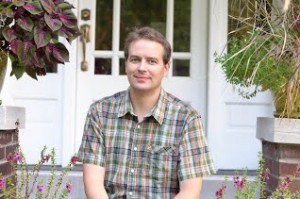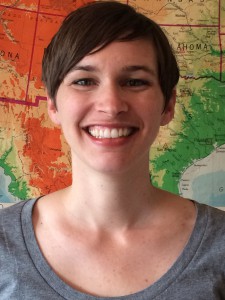Words on Research and Writing
Steven P. Miller (’99) and Abigail Trollinger (’04) chose paths in research and writing, and recently offered reflections about what the field of research and writing has been like for them.
Miller, who earned a Ph.D. in history at Vanderbilt University and teaches at Webster University and Washington University in Saint Louis, recently published his second book, The Age of Evangelicalism: America’s Born Again Years (Oxford University Press, 2014). A historian of U.S. political culture, American religion, and the American South, Miller’s interests converge in his study of Billy Graham, who was the subject of his first book, Billy Graham and the Rise of the Republican South (University of Pennsylvania Press, 2009). In both his books, Miller writes from, perhaps, a controversial viewpoint combining religion and politics. However, Miller argues that such a perspective “accurately reflects the everyday blending of those spheres in recent American life – and in all of American history, for that matter!”

Trollinger recently completed her Ph.D in American history at Northwestern University and is now teaching at St. Norbert College in De Pere, Wisconsin. Instead of attending graduate school immediately after finishing at Goshen College, she spent two years in Mennonite Voluntary Service exploring the non- profit public policy sector as a career field. Discovering that the “world of quick assessment and action” was not for her, she realized she “wanted the space to fully examine the people who came before us, their wants, motivations and beliefs.”
The two historians mention different personal benefits they receive from the pursuit of research and writing. “Research and writing are not always fun, but they are rewarding,” notes Miller. “There is a lot of pleasure in the cycle of encountering historical sources, asking questions about them, making connections, and then at last crafting a new story.” He added, “What attracts me to history writing is the constructive tension between creativity and empiricism. All writing is a creative process, but history is a discipline that forces you to stay grounded. You can’t make up facts, but you can give them new meaning.”
Trollinger appreciates the way research offers a glimpse into the past, and often through a very personal lens. She investigated Depression-era social workers in Chicago who reconfigured local welfare policies before the advent of federal relief and unemployment insurance. “My recent research allowed me to look at case records and correspondence from the 1930’s, documents that were never intended for an audience. Thus, it was both thrilling and a privilege, to see people’s thoughts, almost unfiltered.”

Both have a great appreciation for how Goshen College prepared them for graduate school and a career in this field.
“My time at Goshen really set me up for graduate school and a career in history,” says Trollinger. “At the most basic level, my professors instilled in me a love of history.” She now teaches her own version of Steve Nolt’s class on immigration and ethnicity, a class that captivated her and confirmed her love for history. Her most practical experience came in writing her senior thesis over the course of two semesters. “In our first semester Jan [Bender Shetler] introduced us to the concept and study of historiography, which was crucial in graduate school. And in the second semester John [Roth] taught us how to turn research into good historical writing.”




